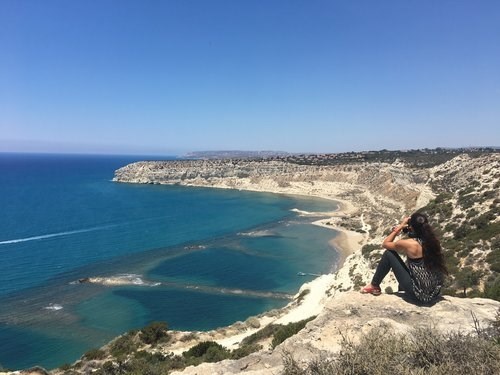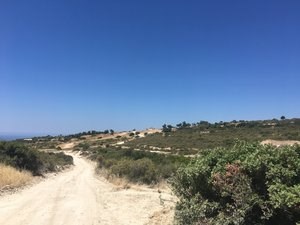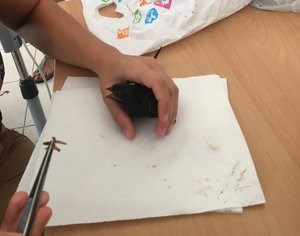Cyprus: An Island of Birds
Posted on in In the Field by ebekah Smith, Education Intern

Driving up a dusty incline through an ancient olive tree grove, we watched as construction workers altered one of the few remaining undeveloped areas on the island of Cyprus in order to build a new road. In Cyprus, old farmlands and wild areas are scarce; however, they serve as havens for the wildlife there, including many species of passerines and raptors.

On a hot day in mid-June, we were scanning the landscape for a flash of blue amongst the green-brown leaves of the stout olive trees. The European roller (Coracias garrulous) population within Cyprus experienced a recent decline, so BirdLife Cyprus has been monitoring the population at historical nesting sites across the island. This historical nesting site was becoming a highway. In Cyprus, the farmland is actually valuable to the wildlife, because human settlement and agriculture has existed there since approximately 8,200 BC. When farmland is lost to tourism and development, it’s a loss for the wildlife, specifically for the nesting bird species of Cyprus.
Leaving the newly forming roadway and heading toward a more narrow, unofficial path, I saw my first European roller sitting on a telephone wire. The vibrant turquoise bird made our day trip across the island well worth our time. This is just one of the many projects BirdLife Cyprus has taken on to protect, study, and educate people about the wild birds of Cyprus. From the start of the decade, BirdLife Cyprus researchers conducted surveys and searched desperately for proof of the successful nesting of griffon vultures (Gyps fulvus) on the island. They finally determined that there were only six to eight individuals left.
In an attempt to prevent the disappearance of the only species of vulture from the island, BirdLife Cyprus coordinated a program with Crete, Greece, in which they captured and transported 25 vultures and brought them to Cyprus to be released in hopes that the species might regain its hold on the island. Since then, they’ve been observing the griffons closely. One pair in particular has captured the attention of BirdLife Cyprus’s head research scientist Christina Ieronymidou. Nestled in the cliffs of Limassol, we watched the pair of vultures—one huddled over their clutch while the other perched close by, scanning the cliff lined shore.
Christina mentioned under her breath that the other vultures in the colony must have headed towards the center of the island for the day in search of carrion, which is not a frequently available resource on the island, as there are only seven known species of mammals nationwide. In contrast, nearly 400 species of birds have been recorded on the island of Cyprus.
The disregard for the ecological importance of birds on the island is a cultural remnant that’s been passed down through generations. In the past, the passerines that migrate through Cyprus along with those that are natives, were a valuable source of protein when no other food was available to the inhabitants. Generations later, they are no longer a necessity for survival but rather a delicacy. During the spring and fall migrations, poachers set up mist nets and lime sticks to capture thousands of unsuspecting birds, even using call recordings to attract them. If the bird species caught is not of culinary interest, they are still killed and discarded.
This 15 million Euro, illegal operation is the source of BirdLife Cyprus’s biggest struggles. Their part in the scheme is mostly lobbying for the passing of bills that would protect the animals, although new legislations could call for decreased fines for poachers and the ability to bring already cooked birds to restaurants, making the illegal birds harder to identify. Pictures leaked of a politician partaking in a passerine dish suggest that authorities may also be involved in support of bird poaching. BirdLife Cyprus is one of the only voices on the island moving against these new legislations and attempting to protect the 150 million migrating birds that pass through the country during each round of migration.
BirdLife Cyprus claims the role of wildlife advocate for the entire island. BirdLife Cyprus works to educate the community, lobby for legislations in favor of wildlife, work closely with the Game and Fauna service on the island, and even sometimes rescue abandoned chicks.
Although BirdLife Cyprus is not a rehabilitation facility, they constantly receive phone calls about abandoned and injured birds. In most cases the birds have to be euthanized by a small animal veterinarian, as there are no exotic veterinarians that know how to treat injured birds on the island. In some cases though, such as the common swift chick (Apus apus) that was delivered to their doorstep, the birds are lucky enough to get a second chance.

Before leaving the office of BirdLife Cyprus, I watched their Development Officer,Elena Markitani, crush the heads of some fresh mealworms and beetles purchased at a local pet store by myself and the assistant researcher Yiannis Christodoulides on the way back from the roller surveys. She gathered them in a pair of tweezers and used her thumb to open the fragile beak of the baby swift. She was trying to force-feed the chick who had suddenly decided it wanted to refuse food—a sign of being ready to leave the nest, despite the fact that it was largely underweight and could not yet fly. I later learned that the baby swift survived it’s last few days of shoebox rehab and was released, hopefully with a brighter future, thanks to BirdLife Cyprus and all they are doing to help the island birds.
As I return to Hawk Mountain Sanctuary for the remainder of my summer education internship, I feel encouraged by the enthusiasm we share with BirdLife Cyprus concerning the protection of wildlife, though the ecosystems in Pennsylvania and Cyprus are in stark contrast. Looking back at the history of Hawk Mountain, I see that BirdLife Cyprus is in a similar position to our founders. Humans are driven to hunt birds all over the world, however it is also our responsibility to make sure that there remains a balance in the populations that we impact. It will take a group effort to reduce the negative impacts that humans have had on wildlife, and it’s good to know that we have allies, even on the other side of the world.